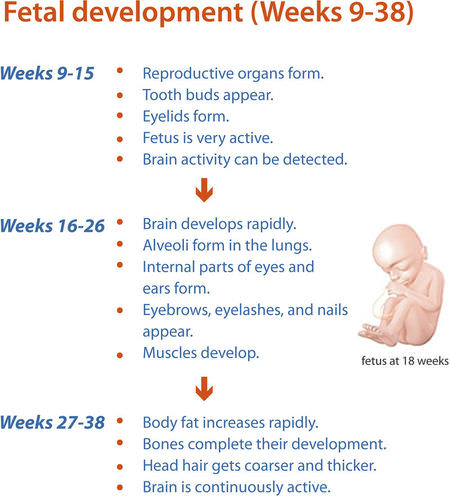First month 4 weeks after birth is the neonatal period of development. Week 1 to Week 8 GA 10are considered the embryonic period of development.

By about 10 weeks of pregnancy two tubes connect the kidneys to the bladder.
Fetal organ development. Time-restricted feeding reduces high-fat diet associated placental inflammation and limits adverse effects on fetal organ development Maternal nutrition has become a major public health concern over recent years and is a known predictor of adverse long-term metabolic derangement in offspring. At the end of the 10th week of pregnancy your baby is no longer an embryo. By the end of the seventh week of pregnancy five weeks after conception your babys brain and face are the focus of development.
Week 9 to week 37 GA 11-39 or birth are considered the fetal period of development. In contrast fetal liver exports cholesterol into the fetal circulation and supplies about half. The outer ears begin to take shape.
The placenta is a fetal organ that exchanges nutrients gases and wastes between the maternal and fetal circulations and thus is crucial for the normal development and survival of the baby. His vital organs such as kidneys intestines brain and liver are starting to function. Her bones are beginning to harden and her genitalia are developing externally.
Redmer et al 2004. In sheep fetal organogenesis is largely complete during early gestation yet only 10 of fetal growth has occurred by d 90 of gestation Vonnahme et al 2003. This 30-week period of development is marked by continued cell growth and differentiation which fully develop the structures and functions of the immature organ.
All babys essential organs have begun to grow. From the time of conception until birth a human fetus undergoes complex changes in its cells and tissues that ultimately produce fully functioning organs. As your baby grows the kidneys will move upward until they reach their final location near the lower part of the back.
Fetal Age 14 to 15 weeks The average 16 week fetus is 71 inches 183 cm long and weighs 52 ounces 146 grams. New information regarding organ development continues to. As you will recall a developing human is called a fetus from the ninth week of gestation until birth.
The embryo has become a fetus. Hearing is beginning to form. Seven weeks into your pregnancy or five weeks after conception your babys brain and face are growing.
Your baby is almost fully formed. Caton and Hess 2010. The placenta is also a rich source of stem cells that are normally discarded after birth.
Shown in Figure 7-2 is a schematic sequence of various organ systems as they develop. Kidneys bladder and urethra As the internal sex organs are developing in the abdomen your babys kidneys are forming nearby. Your babys eyelids are more developed and begin to close.
Fetal brain is responsible for the synthesis of all of its own cholesterol. EMBRYO-FETAL GROWTH AND DEVELOPMENT The complexity of embryo-fetal development is almost beyond comprehension. It is now a fetus the stage of development up until birth.
Any delay or altered growth during gestation can have negative effects. Tiny fingernails and toenails are starting to form. The canalicular period of lung development has started and will continue until 25 weeks.
Fetal development five weeks after conception. Babys facial features become more distinct. The Development of Fetal Organs.
Proper organ and tissue growth during fetal development is essential for optimal health and growth during postnatal life.
